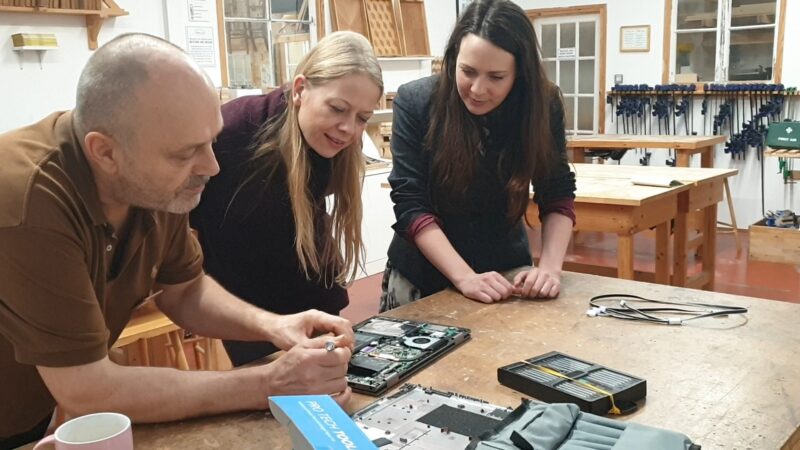The party wants a "right to repair" and more "repair cafes".

The Green Party of England and Wales has promised to end the “throwaway economy” with a new suite of policies designed to encourage repair and reuse.
At a workshop space in south London, the party announced two key policies: enacting a “Right to Repair” and developing “Repair Cafes”.
A comprehensive “Right to Repair” will require manufacturers to keep goods operational for years after purchase and encourage repair and reuse. The practice of producing goods with the deliberate intention that they will become obsolete within a few years time will be banned.
Repair Cafés are free meeting places with the tools, materials, advice and volunteers necessary to fix things like clothes, bicycles, electrical appliances and furniture.
The party said these cafes will give local communities the skills and tools to repair, upgrade and customise their belongings. Using and borrowing equipment will give people access to expensive items such as power tools and sewing machines.
Based on figures from WRAP, this policy could save the average UK household around £800 a year, which is the value of electrical equipment thrown out and replaced.
Sian Berry, Co-Leader of the Green Party, said:
“From the coffee cup you chuck in the bin, to the smartphone you upgrade year after year, disposability is at the heart of our economic model. And we all know it’s not right. It doesn’t feel right. It doesn’t make us happy. Nobody wants to add to the mountains of junk choking our natural world.”
“Today, we are pleased to propose a real Right to Repair, which would make it a legal requirement for companies to lengthen the lifespan of their products, make spare parts available, and build them in ways which can be fixed by everyday tools.
“This is an essential step towards cutting waste and going net-zero by 2030, and none of the other parties are even talking about it.”
Amelia Womack, Deputy Leader of the Green Party, said:
“Today, we’re excited to pledge that Greens will support the creation of a repair cafe on every high street in Britain.
“Our high stress have been devastated over the last ten years. We need to rebuild the fabric of our communities. Repair cafes are just one step to deliver innovative ideas that support people’s needs and save people money, while helping the environment”
The European Union is introducing a “right to repair” directive in 2021 but the Green Party has said its “right to repair” will be much more extensive.
Left Foot Forward doesn't have the backing of big business or billionaires. We rely on the kind and generous support of ordinary people like you.
You can support hard-hitting journalism that holds the right to account, provides a forum for debate among progressives, and covers the stories the rest of the media ignore. Donate today.




3 Responses to “Greens say repair policies could save households up to £800 a year”
Julia Gibb
The reality – We still have a “First Past the Post” voting system. Winner takes all even if it is one vote and a third of the votes available.
Decide who you DON’T want and pick the best candidate to unseat them.
It is more important to unseat Tories than to split the opposition.
Amanda Wells
Repair cafés are a brilliant idea but rely once again on ‘volunteers’ to cover over the gaps left by a society predicated on an economy fuelled by ever increasing consumerism and rising debt. Pressuring manufacturers to provide spares and parts to upgrade and repair their products would be a huge step in the right direction.
Dave Roberts
At first I thought that this was a spoof article but no, it’s serious. Let’s deconstruct it shall we? Where are these repair centres supposed to be and who will buy pr lease them? In other words where is the money coming from? This latter factor is the one that all of those proposing this kind of economy never take into consideration and it is the most basic because what is being proposed is a business and premises and funding are essential parts of a business plan.
Secondly where is the skilled workforce to come from as all of the electronic items being envisaged as the core of the business need a whole range of different skills? People with these skills are already employed so it will be necessary to train or import the skills necessary both of which options cost money, more money for the project.
Lastly will it be commercially viable, meaning will the repaired item be available on the market for the same price as a new model or cheaper? It would have to be substantially cheaper because with technology items are becoming more sophisticated and cheaper all the time. My first lap top cost me £1500 in 2000. It was a very basic dial up with expensive connection costs, the same as a phone call, slow and kept breaking down. I type this on a state of the art model that cost four hundred quid and has soldiered on being used seven or eight hours a day for four years. No competition.